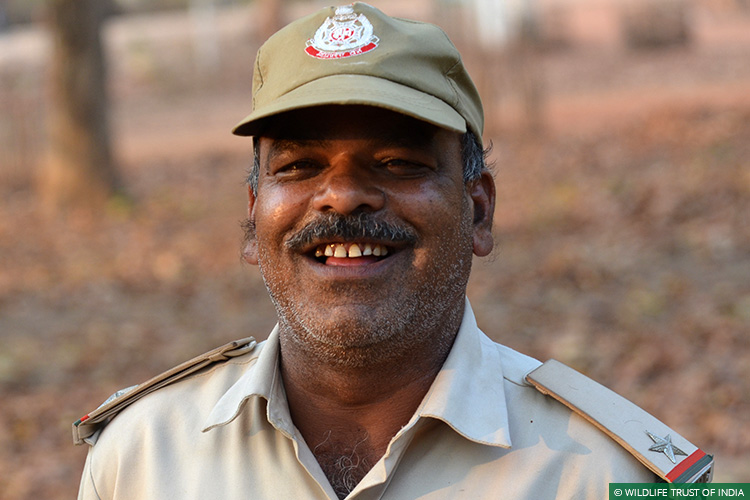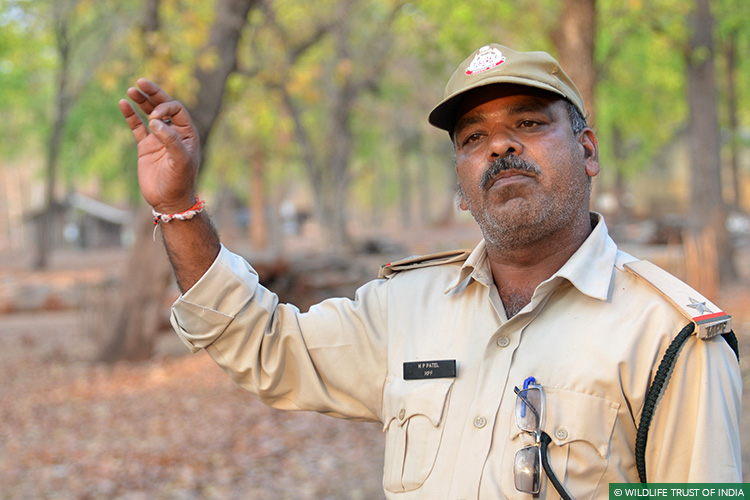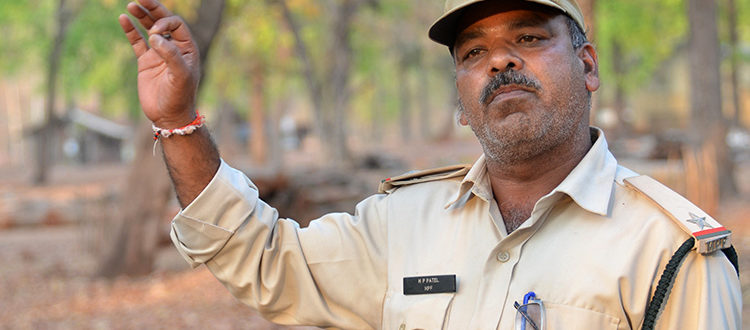Atlas Shrugged
By Jose Louies and Prerna Panwar

Forest guard.
Doesn’t the title itself suggest a massive burden? To guard the unfenced forests, teeming with untamed wild creatures. To be the first line of defence for wildlife and wild habitats when that most dangerous animal of all, man, breaches the invisible legal lines that protect them.
This is the responsibility that Mahesh Patel, a forest guard from Madhya Pradesh, proudly wears. His eyes sparkled when we asked him for some of his experiences from the field. “There were eleven suspects in one spotted deer hunting case I handled”, he said in his booming voice, “and one of them was my brother-in-law.” So what did he do? “I got him arrested, of course! A crime is a crime. My wife was angry and I wasn’t quite welcome in my house for a few weeks. But isn’t that what I’m supposed to do? I have to ensure that all suspects are treated equally, that they are punished in keeping with their crime!”
We met Patel during a series of Wildlife Crime Prevention Training workshops that IFAW-WTI was conducting with the Madhya Pradesh Forest Department in April 2018. The ‘Van Rakshak’ or ‘Guardians of the Wild’ project is one of the most challenging for our team. Typically, a good proportion of frontline staff who attend these training workshops have already completed 20 to 30 years of their service; changing their entrenched perceptions of wildlife crime in a couple of days is a major task!
Patel, who is in his late 50s, has been involved in catching more than his share of poachers. But he was impressed by the new investigative techniques and approaches we were espousing. His childlike enthusiasm and genuine passion for the job shone through during the training, putting some of the newer recruits to shame.
Territorial By Nature
The duties of frontline staff posted in territorial divisions are very different from those who work within the Protected Areas. “We have a hundred different things to do”, Patel explained. “Even now, sitting here in the workshop, our minds are in several places at once. It is summer, and what if a forest fire breaks out? Then there is intense pressure on our forests from illegal felling and encroachment. On top of that we have tigers moving from one Protected Area to another through our wildlife corridors. And people think we have no protection work at all since it’s a territorial division!” — his voice had risen several decibels beyond even its usual sonority.
Most of the incidents Patel regaled us with over several cups of tea were about poaching and the sale of wild meat. A couple were about the hunting of tigers and leopards. “Wildlife criminals are not good people at all,” he declared; “they should be caught and punished well. They kill animals for money and such people should be shown no mercy!” He also proved to be a veritable fount of knowledge on wildlife and forests. He told us about several trees in the area and their various medicinal properties; indeed, talking to him was like reading one of those enthralling natural history books!
“I take pride in wearing my uniform and walk with my head held high, because I am the protector of the forest and its tigers”
The territorial division where Patel is posted falls between two Protected Areas that are famous for tigers and are major tourist attractions: Bandhavgarh and Sanjay Tiger Reserves. Now someone forgot to tell tigers about Protected Area demarcations and where they should or shouldn’t be going. And since the wildlife corridors that tigers use to move between protected forests have a very limited prey base, they sometimes attack cattle in nearby villages. This leads to retaliatory killings by the villagers — it is a simple enough matter to poison a carcass or lay a live wire nearby to kill a tiger. The territorial division bears the brunt of human-wildlife conflict in this area and the lack of specialised training for frontline staff is a major lacuna to address.
We ask Patel what drove him to join the forest service. Was it the security of a government job? “My ancestral village was next to the forest. People used to enter the forest to cut trees and, occasionally, to hunt. I remember that when I was a child a forest guard once came around in his official uniform, asking about some suspects. I knew then that I wanted to become like him, to command that sort of respect. I take pride in wearing my uniform and walk with my head held high, because I am the protector of the forest and its tigers”, he declares.

You won’t see Patel on any of your visits to Bandhavgarh or Sanjay Tiger Reserve. Nor will you find him on Facebook, posting pictures with the caption: ‘Rescued a tiger today’ — he has neither a camera nor a Facebook account. He will continue to do his duty with the same dedication and enthusiasm, and one day, having served out his term, will hang up for the final time his beloved uniform with the lone star on the shoulder tabs. And he will retire quietly to his village.
Perhaps his stories will breed among his grandchildren and community some aspect of his own tremendous respect for nature. He will remain invisible to the public, and he will be a faceless, forgotten member of the conservation fraternity.
Surely the unfenced forests will remember.
Jose Louies is the Chief of Wildlife Trust of India’s Wildlife Crime Control Division. Prerna Panwar is a Programme Officer with the division.









